Sesto San Giovanni
Sesto San Giovanni (Italian pronunciation: [ˈsɛsto san dʒoˈvanni]; Western Lombard: Sest San Giovann [ˈsɛst ˌsãː dʒuˈʋan]), locally referred to as just Sesto (Lombard: Sest), is a comune in the Metropolitan City of Milan, Lombardy, northern Italy. Its railway station is the northernmost stop on the Milan Metro M1 line. The comune has the honorary title of city, despite being a de facto suburb of Milan.
Sesto San Giovanni | |
|---|---|
| Città di Sesto San Giovanni | |
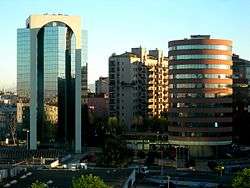 | |
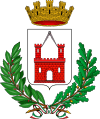 Coat of arms | |
Location of Sesto San Giovanni 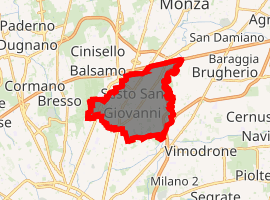
| |
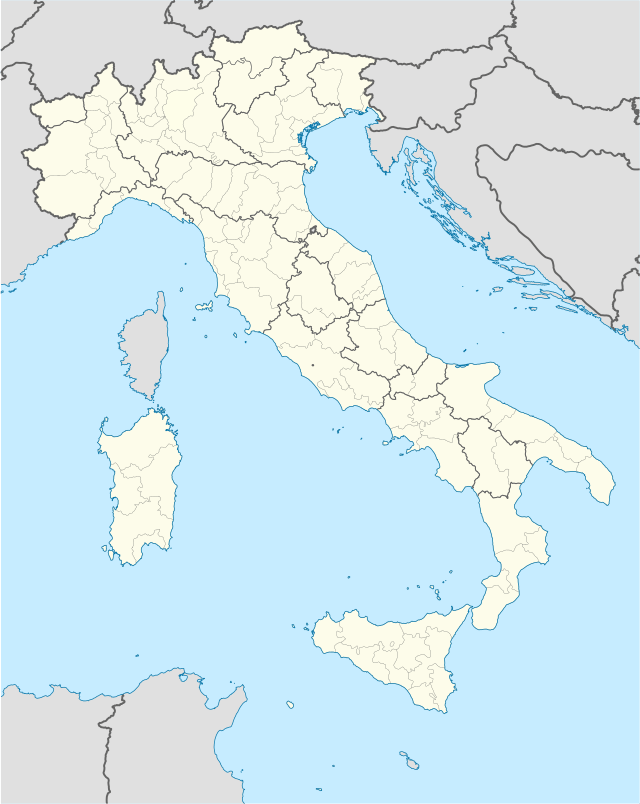 Sesto San Giovanni Location of Sesto San Giovanni in Italy 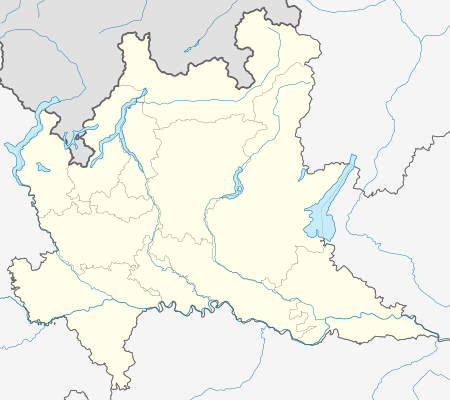 Sesto San Giovanni Sesto San Giovanni (Lombardy) | |
| Coordinates: 45°32′N 09°14′E | |
| Country | Italy |
| Region | Lombardy |
| Metropolitan city | Milan (MI) |
| Frazioni | Rondò-Torretta, Rondinella-Baraggia-Restellone, Isola del Bosco-delle Corti, Pelucca-villaggio Falck, Dei Parchi-Cascina de' Gatti-Parpagliona |
| Government | |
| • Mayor | Roberto Di Stefano (Center-Right) |
| Area | |
| • Total | 11.7 km2 (4.5 sq mi) |
| Elevation | 140 m (460 ft) |
| Population (30 November 2017)[2] | |
| • Total | 81,822 |
| • Density | 7,000/km2 (18,000/sq mi) |
| Demonym(s) | Sestesi |
| Time zone | UTC+1 (CET) |
| • Summer (DST) | UTC+2 (CEST) |
| Postal code | 20099 |
| Dialing code | 02 |
| Patron saint | St. John the Baptist |
| Saint day | June 24 |
| Website | Official website |
An unimportant agglomerate of buildings until the 19th century, Sesto San Giovanni grew during the end of the 19th century and in the early 20th century, becoming the site of several industries, including companies such as Falck, Campari, Magneti Marelli and Breda. In that period the population increased rapidly, from 5,000 inhabitants in 1880 to 14,000 in 1911. After World War II, Sesto became populated by many migrants from other parts of Italy, leading to an increased population of 95,000 inhabitants in 1981. Sesto used to be referred to as the "Stalingrad of Italy", due to the strong historical presence of the Italian Communist Party and to its resistance to fascism in World War Two.
Because of its diverse and growing industries, Sesto has drawn many migrants. Census statistics from 2016 state that 17% of the population is not Italian.[3]
In the 1990s, Sesto San Giovanni suffered an economic crisis, and most of the larger companies in the town closed their premises. The town partially succeeded in converting its economy from steel production to service industries. Several large companies opened offices in Sesto, such as ABB Group, WIND Telecommunications, Impregilo and Oracle Corporation.
On 23 December 2016, Anis Amri, perpetrator of Berlin truck attack was shot fleeing in the city by the police.
Sesto San Giovanni received the honorary title of city by presidential decree on 10 April 1954.
People
- Ferdinando Terruzzi (1924–2014), railway cyclist
- Nicolás Cotugno (born 1938), former Roman Catholic Archbishop of Montevideo, Uruguay
- Gino Strada (born 1948) war surgeon and founder of Emergency, a UN-recognized international humanitarian organisation that gives free medical treatment to victims of war
- Massimo Carrera (born 1964), footballer and coach
- Marco Saligari (born 1965), cyclist
- Barbara Fusar-Poli (born 1972), figure skater
- Fabio Macellari (born 1974), footballer
- Sfera Ebbasta (born 1992), rapper
Twin towns - sister cities
Sesto San Giovanni is twinned with:[4]


References
- "Superficie di Comuni Province e Regioni italiane al 9 ottobre 2011". Istat. Retrieved 16 March 2019.
- "Statistiche demografiche ISTAT". Demo.istat.it. Retrieved 2016-12-23.
- "Statistiche demografiche ISTAT". Demo.istat.it. Retrieved 2016-12-23.
- "Gemellaggi e patti d'amicizia". sestosg.net (in Italian). Sesto San Giovanni. Retrieved 2019-12-15.